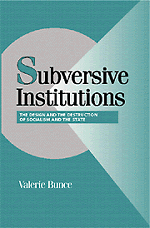Book contents
- Frontmatter
- Contents
- Preface
- 1 The Collapse of Socialism and Socialist States
- 2 Domestic Socialism: Monopoly and Deregulation
- 3 Federalism and the Soviet Bloc: Monopoly and Deregulation
- 4 Leaving Socialism
- 5 Leaving the State
- 6 Violent versus Peaceful State Dismemberment
- 7 Institutions and Opportunities: Constructing and Deconstructing Regimes and States
- Notes
- References
- Index
- Continuation of Series List
4 - Leaving Socialism
Published online by Cambridge University Press: 05 June 2012
- Frontmatter
- Contents
- Preface
- 1 The Collapse of Socialism and Socialist States
- 2 Domestic Socialism: Monopoly and Deregulation
- 3 Federalism and the Soviet Bloc: Monopoly and Deregulation
- 4 Leaving Socialism
- 5 Leaving the State
- 6 Violent versus Peaceful State Dismemberment
- 7 Institutions and Opportunities: Constructing and Deconstructing Regimes and States
- Notes
- References
- Index
- Continuation of Series List
Summary
Never was any event so inevitable, yet so completely unforseen.
Alexis de Tocqueville (on the French Revolution)All of the socialist regimes in Europe depended for their survival on maximizing economic growth and maintaining the party's economic and political monopoly. Indeed, these two preconditions for rule were inextricably linked. If the economy faltered, especially over an extended period of time, then the regime would necessarily weaken in the face of deregulatory pressures. Thus, already contentious elites would become more so; the capacity of the upper levels of the party to control its lower levels would atrophy; and the party would be forced to renege on its promise to publics and elites alike to expand resources. As a consequence, the upper levels of the party and its lower levels, the regime and the society, would each go its separate way.
What also made growth imperative was the absence of political capital. Because they had become evermore flaccid dictatorships, these regimes had fewer and fewer mechanisms, aside from socioeconomic transfers, for either forcing or encouraging the compliance of ministries, enterprises, local party secretaries, and even publics. Thus, in addition to the irony that the party's monopolistic structure was itself a mechanism for deregulation was yet another one. Regimes that had long castigated capitalism for its short-term horizons and that prided themselves on the long-term vistas enabled by planning, state ownership of the economy, and Communist Party rule were increasingly placed in the position of making decisions in response to a single question: what have you done for me lately?
- Type
- Chapter
- Information
- Subversive InstitutionsThe Design and the Destruction of Socialism and the State, pp. 56 - 76Publisher: Cambridge University PressPrint publication year: 1999

